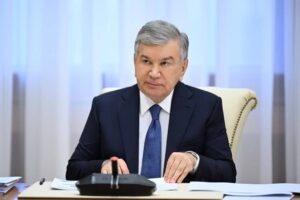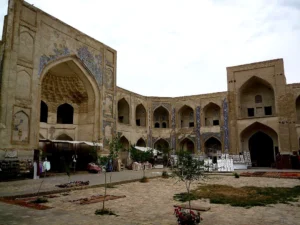Abulfayzkhan Madrasa in Bukhara – An Ancient Center of Knowledge

For centuries, Bukhara has been a crossroads of culture and civilization. Every brick, every stone of the city carries its own history. Among its ancient monuments is the madrasa associated with the name of Abulfayzkhan.
This madrasa was built in the 18th century. As a center of religious learning, it is considered an important part of the city’s architectural ensemble. Its architectural decorations, gypsum and carved ornaments, arches and domes reflect the style of that period.
The madrasa was constructed by Abulfayzkhan (1711–1747), the last ruler of the Ashtarkhanid dynasty in the Bukhara Khanate. Although his reign was marked by internal strife and external invasions, Abulfayzkhan paid great attention to culture and scholarship. In his palace, he gathered intellectuals, poets, and scholars. He also initiated the repair of mosques and madrasas as well as the construction of new buildings.
The Abulfayzkhan Madrasa was built in line with the architectural traditions of its time. It is a two-story structure, consisting of cells arranged around corridors and a courtyard. Each cell housed students who lived and pursued their studies there. The grand portal and gypsum decorations of the façade added majesty to the madrasa. Builders made wide use of blue and white tiles, while geometric and floral patterns adorned the arches and domes.
The madrasa housed collections of manuscripts and hosted lectures and debates. Historical sources note that many scholars emerged from this institution. Thus, the madrasa served not only as a center of religious learning but also as a place where philosophy, literature, and logic were taught.
Today, the Abulfayzkhan Madrasa attracts numerous tourists. For the local population, it remains a source of historical memory and spiritual pride. Preserving its historical appearance is an important task in passing on national heritage to future generations.
The Abulfayzkhan Madrasa is not merely an architectural monument, but a symbol of the people’s devotion to knowledge, their spiritual aspirations, and their historical identity. More than the turbulent political events of its time, it vividly expresses the continuity of culture and spirituality.


